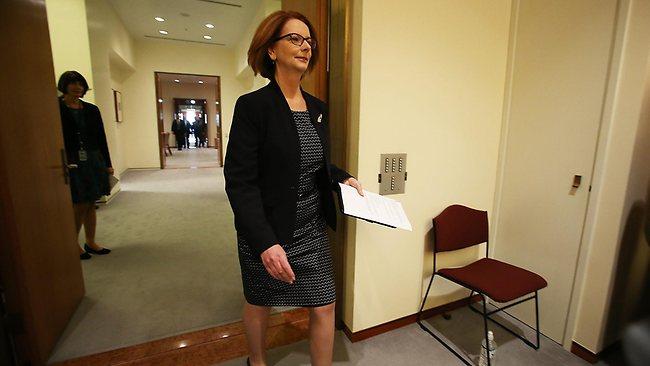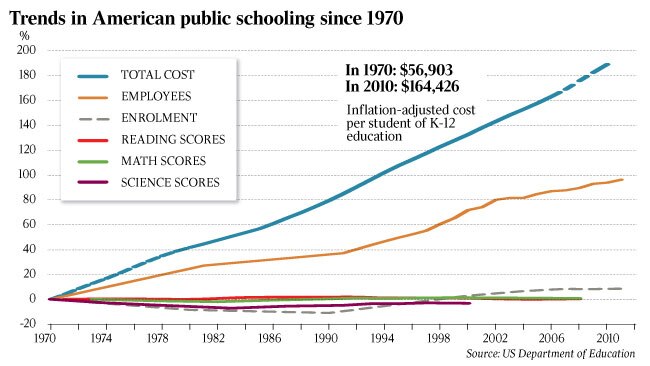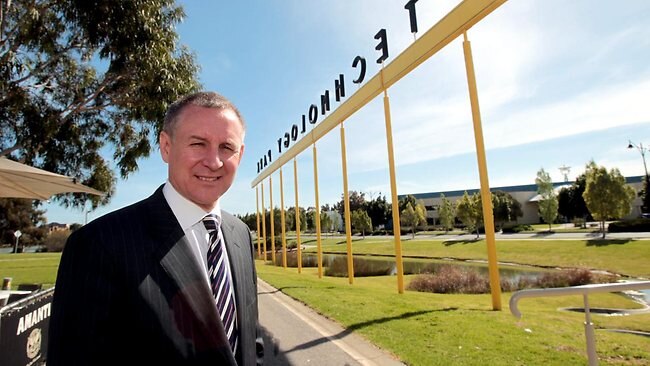States abandon Prime Minister on schools
PREMIERS will fight Julia Gillard over school funding reforms, forcing her to face an election while defending public school spending cuts.

PREMIERS are prepared to stare down Julia Gillard over reforms to the school funding system, leaving her to fight an election campaign having to defend spending cuts in public schools.
After starting yesterday's meeting of the Council of Australian Governments trying to force a deal to inject an extra $14.5 billion over six years into schools, the Prime Minister suffered a setback when not one state signed on to the plan.
The failure to sign up any state will cast doubt on the federal government's ability to deliver one of its key reforms, leaving Ms Gillard to campaign on school funding for the September election, casting the recalcitrant states as not passionate about education.
After setting a June 30 deadline for the states and territories to agree to the Gonski plan, Ms Gillard faces having to defend cutting funding to schools in those states that fail to reach agreement - six weeks before the start of the official election campaign.
Ms Gillard yesterday confirmed that states that chose to continue under existing funding arrangements would have their federal funding cut, meaning they would lose millions of dollars in targeted funding programs.
The states also rebuffed suggestions they hand over unexplained wealth laws to the commonwealth, forcing a crackdown on gang violence back to negotiations between officials, police ministers and attorneys-general.
Ms Gillard made further progress on the national disability insurance scheme with the ACT signing on to the deal and the Northern Territory agreeing to details of a trial.
Under the proposed new school funding arrangements, the commonwealth would pay $2 for every extra $1 invested by the states and a higher indexation rate of 4.7 per cent if the states committed to increasing their school budgets by 3 per cent a year across the next six years.
The Prime Minister's refusal to negotiate over any element of the school funding plan left her further away from making a deal, particularly with Western Australia and Queensland.
It is understood Queensland Premier Campbell Newman believed after the discussions that a deal was even less likely than when he entered the room.
Even the "friendly" Labor governments of South Australia, Tasmania and the ACT failed to endorse the deal, although they, along with NSW and Victoria, are hopeful of reaching agreement by the June 30 deadline set by Ms Gillard.
The Prime Minister said she intended "in a very determined fashion to make sure our nation makes the right choice" and reach agreement with the states and territories before June 30.
"I'll be pursuing this every day, working through it to make sure our nation seizes this opportunity," she said at a joint press conference with all premiers and chief ministers.
West Australian Premier Colin Barnett rejected the commonwealth's offer of $300 million additional funding to his state's schools as an insufficient incentive.
While Mr Barnett said the state government would continue talks with the commonwealth on school funding, he resented the approach taken by the federal government in negotiating the deal, which was discussed by leaders for the first time yesterday.
"The money doesn't draw us in," he said. "Western Australian expenditure on schools is at least 25 per cent above the 2019 target so there's little attraction for us. We will stay in the debate but there's little in the financial offer to attract us at the moment."
Mr Barnett said his main concern was that the new funding model altered responsibility for the funding of public and private sectors, shifting state funds from public to private schools.
"I have a fundamental view that the prime responsibility of the state government is state government schools and most children go to a state government school in Western Australia," he said. "This proposal would see state government spending on education progressively shift from state government schools to Catholic and independent schools, which is a pretty significant policy decision that hasn't been discussed."
Ms Gillard said the model did not shift funds from state schools to non-government schools but was about ensuring every school had the resources it required to educate its students.
Mr Newman said the state government faced an $8bn deficit next year, and while it had increased school funding by $835m across the next five years, it was a struggle to find the $1.3bn across six years demanded by the commonwealth.
"We are also concerned by a number of things we believe are centralist in approach, prescriptive and overly bureaucratic and that needs to be dealt with," he said.
Victorian Premier Denis Napthine said his state feared the national partnership for early childhood education, while extended for 18 months, failed to guarantee long-term funding for preschools.
NSW Premier Barry O'Farrell said his state would continue negotiations and its efforts to find $1.7bn required as their share of the extra money. He said losing $300m a year in national partnership funding from the commonwealth "would be a significant cost to NSW schools".
"We are determined to deliver this package if it's in the best interests of NSW," he said.
South Australian Premier Jay Weatherill was unsure whether the state could reach agreement by the end of June but he wanted to ensure a strong public education sector.
Mr Weatherill said it was in the long-term national interest for the commonwealth to be involved in funding public schools, not just private schools as at present.
Tasmanian Premier Lara Giddings said her state was prepared to fund the extra money required and the failure to sign yesterday was not about money but final details of the model.
Territory Chief Minister Adam Giles said the deal was "unsatisfactory" for the territory, and the money it was required to find was "unsustainable".
ACT Chief Minister Katy Gallagher was confident of reaching agreement by the deadline and supported the plan even though there was little extra money for ACT schools.
The setback suffered by Ms Gillard is reflected by an earlier draft of the COAG communique, distributed to state and territory leaders before the meeting, that noted a "historic commitment to the next stage of reforms to Australia's school education system" had been achieved.
After the meeting, COAG was noted as having only "affirmed its commitment to ongoing negotiations".
ADDITIONAL REPORTING: LAUREN WILSON





